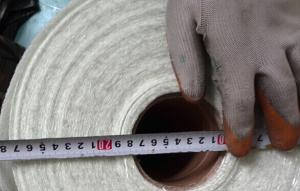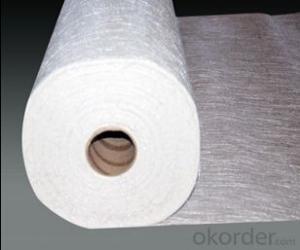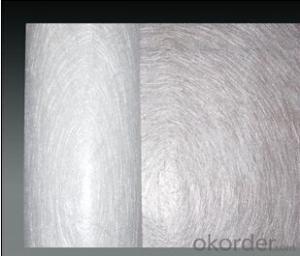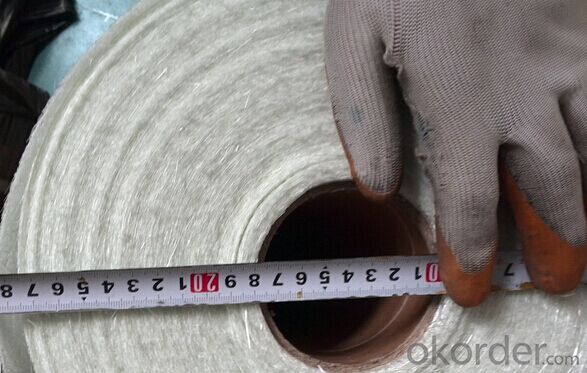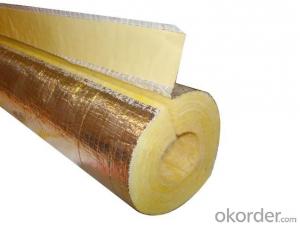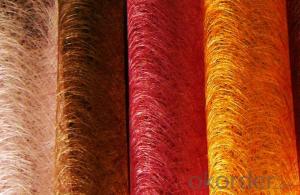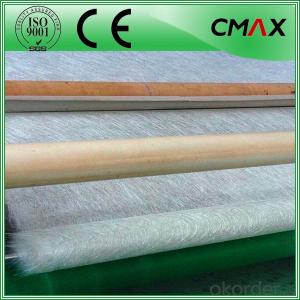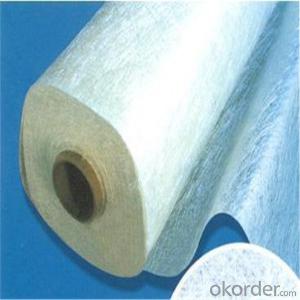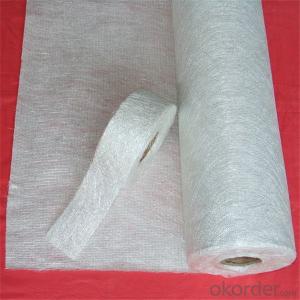Fiberglass Mat Tissue Chopped Strand Mat
OKorder Service Pledge
OKorder Financial Service
You Might Also Like
Introduction of E-glass Chopped Strand Mat
Chopped strand mat is made from fiberglass chopped strands boned with powder binder or emulsion binder.
E glass chopped strand mat is made from fiberglass strands chopped to length and bonded together
with powder binder. Chopped strand mat is used primarily for hand lay-up processes, filament winding and press molding of FRP products. Typical products include bathroom
accessories, pipe, building materials, automobiles, furniture and other FRP products.
This products ischaracterized bg good combination of resin,easg operation ,good wet strengthretention,good laminate transparency
E glass chopped strand mat is made from fiberglass strands chopped to length and bonded together
with powder binder. Chopped strand mat is used primarily for hand lay-up processes, filament winding and press molding of FRP products. Typical products include bathroom
accessories, pipe, building materials, automobiles, furniture and other FRP products.
Features of E-glass Chopped Strand Mat
1.Warp and weft rovings aligned in a parallel,flat manner and uniform tension .
2.Densely alighed fibers,providing high dimensional stability ans easy handing .
3.Good moldability,fast and complete resin wet-out ,enabling high productively .
4.Good transporsision and hign strength of the composite products.
5.Even thickness ,no fuzz ,no stain.
6.Fast wet-out ,products with high strength ,little loss for strength in damp situation.
7.fiberglass woven roving has the features of : high tensile strength, corrosion resistance, flame retardance,insulativity.main function
8.applied to hand lay-up process
9.to reinforce UP resin
Features of E-glass Chopped Strand Mat
1.the composit products have high dry and wet tensile strenth and good transparency.
2.Low fuzz ,dirt ,impurity and other stain
Images of E-glass Chopped Strand Mat
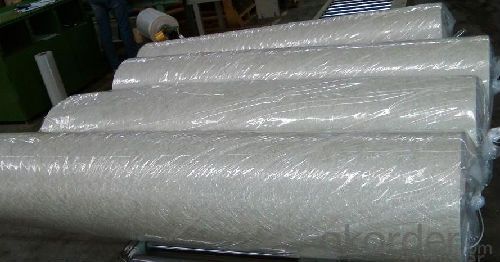
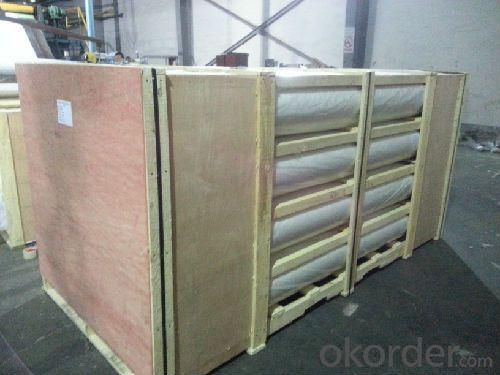
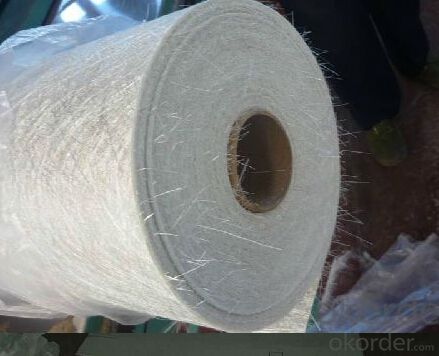
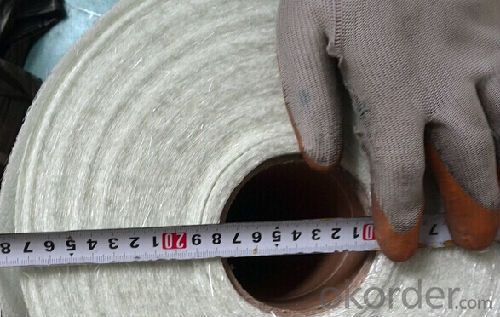
E-Glass Chopped Strand Mat Specification:
Property | Glass type | Weight(g/m2) | Width 200~3300 | Roll Weight | Moisture Content /% | Combustible Content /% | Breakage Strength /N |
Test Method | GB/T 1549 | ISO3374:2000 | ISO3374 | GB/T17470-1998 | ISO3344:1997 | ISO1887:1995 | ISO3342 |
EMC 80 | E-GLASS | 80±16 | ±5 | 6~50 | <0.2 | 13.6±0.35 | ≥200 |
EMC 100 | E-GLASS | 100±10 | ±5 | 6~65 | <0.2 | 9.5±0.35 | ≥170 |
EMC 150 | E-GLASS | 150±15 | ±5 | 6~97 | <0.2 | 8.0±0.35 | ≥40 |
EMC 225 | E-GLASS | 225±22 | ±5 | 6~150 | <0.2 | 5.0±0.6 | ≥60 |
EMC 300 | E-GLASS | 300±30 | ±5 | 6~180 | <0.2 | 4.0±0.6 | ≥90 |
EMC 450 | E-GLASS | 450±45 | ±5 | 6~180 | <0.2 | 3.8±0.6 | ≥120 |
EMC 600 | E-GLASS | 600±60 | ±5 | 6~240 | <0.2 | 3.6±0.6 | ≥150 |
EMC 900 | E-GLASS | 900±90 | ±5 | 6~190 | <0.2 | 3.4±0.6 | ≥180 |
FAQ of Chopped strand mat
1. Why Choose us?
CNBM is a stated own company, provide the guarantee for the best quality, best service and safety business.
2. How will we guarantee the quality?
a, ISO 9001-2008 quality control system;
b, Strict and regular quality control in production;
c, Inspeciation when loading into container before shippment;
d, Sample stock for one year for quality tracing and record.
3. What is your MOQ?
Our MOQ is one pallet.
4. Can you provide sample?
Yes, samples are in stock. we can offer free sample for you.
5. Payment terms?
We can accept L/C, T/T etc.
6. Do you offer OEM service?
Yes, we can print customers’ logo on the packaging;
And the size and specification can be produced and design according to your demand.
7. What is the Production Lead Time?
1 *40HQ each day.
- Q: How long does fiberglass mat tissue last?
- The lifespan of fiberglass mat tissue can vary depending on various factors such as its quality, usage, and exposure to external conditions. Generally, fiberglass mat tissue is designed to be highly durable and long-lasting. When properly installed and maintained, it can typically last for several decades. However, it is important to note that fiberglass mat tissue can deteriorate over time due to environmental factors such as UV exposure, moisture, and temperature fluctuations. Continuous exposure to harsh weather conditions, extreme temperatures, or chemicals can accelerate the degradation process. To maximize the lifespan of fiberglass mat tissue, it is crucial to follow the manufacturer's guidelines for installation, maintenance, and periodic inspections. Regular inspections can help identify any signs of wear, damage, or degradation early on, allowing for timely repairs or replacements. It is recommended to consult with a professional or the manufacturer for specific information regarding the expected lifespan of a particular fiberglass mat tissue, as it can vary depending on the specific product and its intended application.
- Q: Is fiberglass mat tissue suitable for insulation in wastewater treatment plants?
- Indeed, fiberglass mat tissue proves to be a suitable option for insulation within wastewater treatment plants. To prevent the dissipation of heat, regulate temperature, and safeguard against corrosion, insulation becomes a frequent necessity in such facilities. Owing to its elevated thermal resistance, exceptional chemical resistance, and durability, fiberglass mat tissue emerges as a commonly employed material for insulation in these establishments. By effectively insulating pipelines, storage tanks, and other equipment within wastewater treatment plants, it guarantees optimal functionality and energy efficiency. Furthermore, its lightweight nature, ease of installation, and cost-effectiveness render fiberglass mat tissue a pragmatic selection for insulation in these rigorous environments.
- Q: How thick is fiberglass mat tissue typically?
- Fiberglass mat tissue typically has a thickness ranging from 0.3 to 0.6 millimeters.
- Q: Is fiberglass mat tissue resistant to mold growth?
- Yes, fiberglass mat tissue is resistant to mold growth. Fiberglass is made from glass fibers that are tightly woven together, creating a material that is highly resistant to moisture and mold. Additionally, fiberglass is non-porous, meaning it does not absorb water, which further inhibits the growth of mold. This makes fiberglass mat tissue an ideal choice for applications where mold resistance is important, such as in insulation, wallboards, and other construction materials.
- Q: How does fiberglass mat tissue perform in terms of moisture absorption?
- Fiberglass mat tissue performs exceptionally well in terms of moisture absorption. Due to its composition of fine fibers, it has a high surface area which enables it to quickly absorb moisture. Additionally, fiberglass mat tissue is hydrophobic, meaning it repels water and does not retain moisture for extended periods. This characteristic makes it an ideal material for applications where moisture resistance is crucial, such as in the construction of waterproofing membranes or in the manufacturing of boats and water tanks. Overall, fiberglass mat tissue demonstrates excellent performance in preventing moisture absorption and maintaining its structural integrity even in wet environments.
- Q: How does fiberglass mat tissue perform in terms of moisture resistance?
- Fiberglass mat tissue is known for its excellent moisture resistance properties. The material is made up of tightly woven fiberglass strands, which create a barrier against moisture penetration. This makes it highly effective in preventing water or moisture from seeping through and damaging underlying surfaces or structures. Additionally, the resin used to bind the fiberglass strands together also adds an extra layer of protection against moisture, making it even more resistant to water and humidity. Overall, fiberglass mat tissue is a reliable choice when it comes to moisture resistance, making it suitable for various applications where preventing water damage is crucial.
- Q: Can fiberglass mat tissue be used for roofing applications?
- Certainly, roofing applications can utilize fiberglass mat tissue. This lightweight and flexible material finds widespread use in the construction industry for a multitude of purposes, with roofing being one of them. It serves as a reinforcement layer, bolstering the strength and durability of roofing systems. Typically, the fiberglass mat tissue is saturated with bitumen or other waterproofing substances to establish a water-resistant shield atop the roof. Additionally, it contributes to augmenting the fire resistance and thermal insulation characteristics of the roof. Furthermore, fiberglass mat tissue's resistance to mold, mildew, and other prevalent roofing problems makes it an excellent option for roofing applications.
- Q: What is the flexural strength of fiberglass mat tissue?
- The flexural strength of fiberglass mat tissue refers to its ability to resist bending or flexing without breaking. It is typically high due to the reinforcing properties of the fiberglass material, making it suitable for applications requiring structural integrity and resistance to deformation.
- Q: Is fiberglass mat tissue suitable for HVAC insulation?
- Yes, fiberglass mat tissue is suitable for HVAC insulation. Fiberglass mat tissue is a lightweight and flexible material that is commonly used in insulation applications due to its excellent thermal insulation properties. It provides effective heat insulation, helping to maintain a comfortable and energy-efficient environment within HVAC systems. Additionally, fiberglass mat tissue is resistant to moisture and does not promote the growth of mold or mildew, making it a suitable choice for HVAC insulation where condensation and moisture may be present. It is also easy to install and can be cut to fit around HVAC components, ensuring a proper and tight insulation seal. Overall, fiberglass mat tissue is a reliable and durable insulation material that is widely used in HVAC systems to enhance energy efficiency and thermal performance.
- Q: Is fiberglass mat tissue suitable for railway rolling stock?
- Yes, fiberglass mat tissue is suitable for railway rolling stock. Fiberglass mat tissue is a lightweight and durable material that is commonly used in the construction industry for various applications, including in the manufacturing of railway rolling stock. It offers excellent mechanical strength and resistance to corrosion, making it ideal for use in the harsh and demanding environments that railway rolling stock typically operates in. Additionally, fiberglass mat tissue has good thermal insulation properties, which can help to improve the energy efficiency of the rolling stock. Overall, fiberglass mat tissue is a suitable and reliable choice for the construction and maintenance of railway rolling stock.
Send your message to us
Fiberglass Mat Tissue Chopped Strand Mat
OKorder Service Pledge
OKorder Financial Service
Similar products
Hot products
Hot Searches
Related keywords
